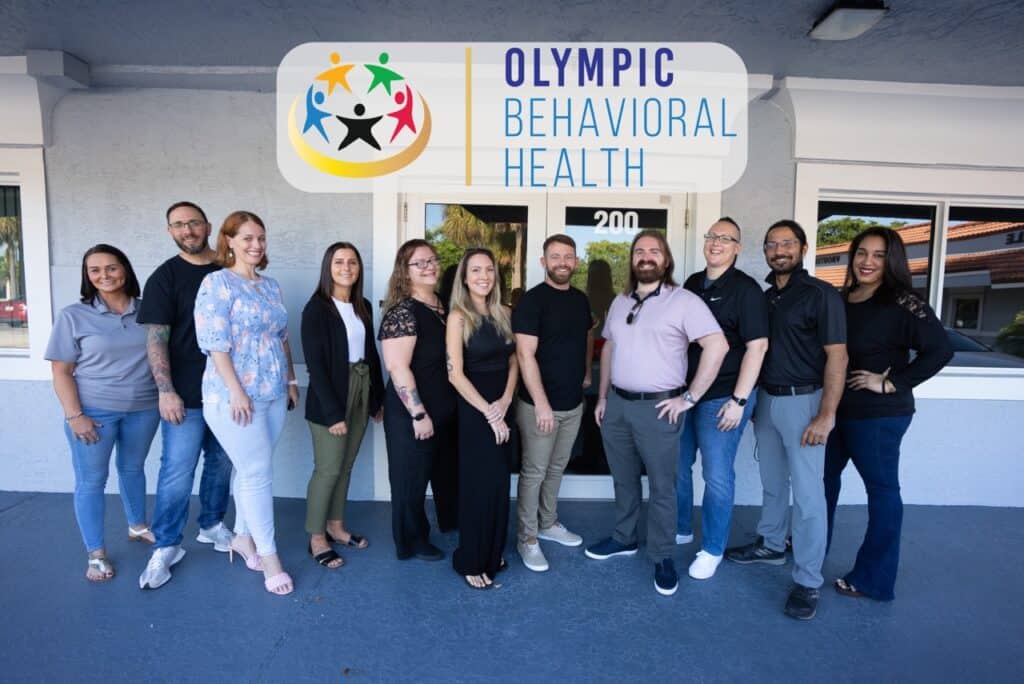Olympic Behavioral Health is an innovative drug and alcohol rehabilitation center in West Palm Beach, Florida. We understand the unique challenges of treating those suffering from post-traumatic stress disorder (PTSD) and provide dual-diagnosis care to clients. Here, we offer a specialized mental health treatment program that combines evidence-based practices, psychotherapy, and support groups to help folks with PTSD regain control of their lives.
What Is Post-Traumatic Stress Disorder?
Post-traumatic stress disorder (PTSD) is a mental health condition that can develop after experiencing or witnessing an event involving actual or threatened death, serious injury, or sexual violence. PTSD can affect anyone regardless of age, gender, race, or nationality. Those with PTSD often experience high levels of distress and psychological problems such as intrusive thoughts, flashbacks, and nightmares even years after the traumatic event. Other common symptoms include avoidance of the trauma memory, hypervigilance, increased startle responses, depression, anxiety, sleep disturbances, guilt, shame, and social isolation.
The exact causes of PTSD are unknown, although there appears to be a combination of both environmental exposure to trauma and genetic factors that contribute to the development of this disorder. It is known that around 6% of the population in the United States will experience PTSD at some point in their life (1). Unfortunately, this condition also leads to alcohol or drugs to help cope with symptoms, leading to substance use disorder requiring specialized care for dual diagnosis recovery.
Effective Treatment Approaches for Post-Traumatic Stress Disorder (PTSD)
Treatment for PTSD may vary depending on each individual’s needs and circumstances. Evidence-based practices such as cognitive behavioral therapy (CBT), dialectical behavior therapy (DBT), and eye movement desensitization reprocessing (EMDR) are effective in addressing symptoms associated with this disorder. These treatments help our clients to learn skills for managing emotions more effectively, so they don’t turn to unhealthy coping strategies like substance abuse. With proper support from qualified professionals and loved oneswith post-traumatic stress disorder can reclaim their lives and find hope for recovery.

Post-Traumatic Stress Disorder and Substance Abuse as Co-Occurring Conditions
Post-traumatic stress disorder (PTSD) and substance use disorder (SUD) often occur in tandem, creating a complex cycle of symptoms that can be difficult to manage. People with PTSD are more likely to develop SUD due to their increased levels of anxiety, depression, and other negative emotions caused by their trauma. They can often use drugs (2) or alcohol to cope with their emotional pain.
Conversely, anyone who struggles with SUD are also more prone to developing PTSD as they are exposed to situations that increase the risk of traumatic memories reemerging. Long-term use of certain substances like opioids can cause changes in brain chemistry, making it even harder to cope with the emotions associated with PTSD. This dual diagnosis can be further complicated by any underlying mental health issues or social problems they’re struggling with.
Individuals diagnosed with PTSD and SUD to successfully recover need to receive comprehensive treatment from qualified professionals. There should be an emphasis on treating both conditions simultaneously rather than on either one exclusively. Treatment should include counseling sessions such as cognitive behavior therapy (CBT), dialectical behavior therapy (DBT), and eye movement desensitization and reprocessing therapy (EMDR). Medications may be prescribed, such as antidepressants or antipsychotics, to address any underlying mental health issues that have been complicating recovery efforts. Finally, social support is imperative in providing accountability and helping them remain committed to sobriety while continuing toward long-term healing.
Why Is a Specialized Mental Health Treatment Program Necessary?
A specialized mental health treatment program purposely designed to address the symptoms of PTSD is necessary to provide comprehensive care that meets the needs of each individual patient. Traditional treatments such as talk therapy are helpful for some cases of PTSD. But not every patient will respond positively to this approach alone. Anyone suffering from PTSD needs to find a comprehensive treatment plan that includes evidence-based practices such as Dialectical Behavioral Therapy (DBT). Additionally, access to support groups and other forms of psychotherapy are criticalcomponents of successful recovery from PTSD.
People who experience PTSD often find themselves in a cycle of symptoms such as intrusive thoughts, flashbacks, nightmares, avoidance of traumatic reminders, depression and anxiety, sleep disturbances, and social isolation. These symptoms can be even more debilitating when an individual’s PTSD is untreated or improperly managed. When you want to learn how to manage PTSD flashbacks, visit our page about managing PTSD flashbacks.
That is why it is crucial for anyone with PTSD to seek specialized treatment from qualified professionals. A mental health program focused on PTSD helps clients learn valuable skills to manage their symptoms more effectively and allows them to address the underlying causes of their disorder rather than just managing the symptoms. A focused treatment program can provide a safe environment where they feel supported and understood. As they cope with the trauma they have experienced, they learn new ways to cope with their emotions without resorting to unhealthy behaviors like substance abuse.
Many who are diagnosed with PTSD are also prone to developing substance use disorders or other co-occurring conditions like depression or anxiety. They must receive comprehensive care that considers all facets of their mental health. Specialized treatment programs for dual diagnosis recovery provide integrated therapies such as cognitive behavioral therapy (CBT), dialectical behavior therapy (DBT), and eye movement desensitization and reprocessing therapy (EMDR). In this way, they can best meet an individual’s unique needs and circumstances so that they can get back on track to living a healthier life.
What Makes Olympic Behavioral Health Unique?
At our Drug Raheb Olympic Behavioral Health in West Palm Beach South Florida , we believe in providing quality care tailored specifically for each individual who walks through our doors. Our team consists of medical professionals, including psychiatrists, psychologists, and therapists. They specialize in understanding the complexity of trauma and working with individuals struggling with issues related to substance abuse and mental health disorders such as PTSD. Our PTSD treatment program in West Palm Beach, FL, provides dual diagnosis care for people struggling with addiction issues and mental health disorders like PTSD. We also hold support groups for clients to get peer support during their recovery journey. And we support onsite detox and residential treatment that provide round-the-clock monitoring and evaluation and intensive behavioral therapies. Transitioning from residential to PHP or IOP is easy. Those who need it most receive all the help they need at Olympic Behavioral Health.
The Five Core Services of Olympic Behavioral Health’s Addiction Treatment Programs
- Medical Care
- Physical examinations and screenings.
- Monitoring vital signs (blood pressure, heart rate, respiration rate, temperature, oxygen saturation).
- Identifying underlying medical issues related to substance abuse.
- Individual Counseling
- Developing coping skills for managing cravings and triggers.
- Addressing the underlying causes of addiction.
- Creating strategies for long-term recovery.
- Group Therapy
- Sharing experiences and challenges in recovery.
- Building support systems within the group.
- Practicing relapse prevention skills.
- Gaining insights from others’ addiction management.
- Family Therapy
- Educating families on the impact of substance use disorder.
- Creating healthier family dynamics.
- Providing support for the recovery process.
- Aftercare Planning
- Transition assistance into everyday life post-treatment.
- Referrals to community resources (e.g., 12-step meetings, sober living houses).
- Ongoing individual or group therapies for sustained sobriety.
Overview of Olympic Behavioral Health’s PHP and IOP Programs for Dual Diagnosis: PTSD & Addiction
Olympic Behavioral Health offers Partial Hospitalization Program (PHP) and Intensive Outpatient Program (IOP) specifically designed for individuals dealing with trauma, PTSD, and addiction. These programs integrate psychotherapy, medications, and support groups, targeting dual diagnosis recovery.
- PHP Program: Offers intensive treatment with individual, group, and family therapy sessions five days a week, balancing emotional healing and home life.
- IOP Program: A flexible, three-day-a-week program focusing on long-term coping strategies for emotional management in dual diagnosis cases. When you want to learn more about our IOP Program, visit our page about our IOP Program in West Palm Beach.
- Cognitive Processing Therapy (CPT): A key component in both programs, CPT helps clients identify and change negative thought patterns to prevent relapse.
- Support Groups: Facilitate shared experiences and insights, aiding in managing PTSD symptoms and addiction recovery.

Begin Your Path to Recovery with Olympic Behavioral Health
Olympic Behavioral Health is committed to offering a safe and supportive environment through its PHP and IOP programs, tailored for effective mental health care and sustainable recovery. Contact us today to access comprehensive care for PTSD and addiction recovery, and take the first step towards a healthier, more fulfilling life.
(1) https://www.ptsd.va.gov/understand/common/common_adults.asp
(2) https://www.ncbi.nlm.nih.gov/pmc/articles/PMC4014033/




